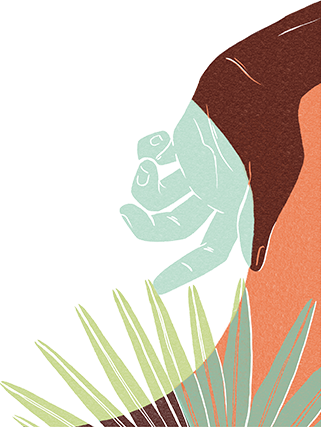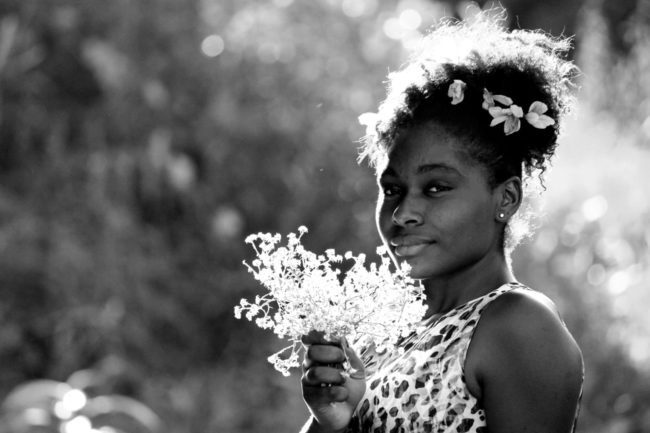 05.07.2022
05.07.2022
Support for quilombola communities: Creating bridges for good living
Cover image: Tamiris Ferreira de Jesus – Quilombo dos Rufinos. Photo: Thiago Rodrigues
The quilombola peoples of Brazil have a close relationship with nature surrounding their territories and pass from generation to generation their traditional and ancestral knowledge, which involves a rich and diverse culture. According to data from the IBGE and the National Coordination for the Articulation of Quilombos (CONAQ), it is estimated that there are around 6,000 quilombola communities in Brazil. Among these communities, only 5% are in officially recognized and demarcated territories. These communities suffer from the consequences of structural racism, invisibility and threats to their territories. Recently, the difficulties have multiplied after the impacts caused by the covid-19 pandemic, with the lack of access to public health services, economic difficulties and, consequently, food insecurity.

Gruta dos Brejões. Photo: Leandro Ribeiro and Lenec Mota (distropya.com)
It was to support quilombola communities to face the difficulties brought about by the pandemic that the Casa Fund launched in 2021 the Call for Projects to Support Quilombola Communities in Facing the Impacts Caused by Covid-19, focusing on the North and Northeast regions, where are located most quilombola communities in Brazil. The Call had a total value of R$1 million and supported 33 projects with budgets of up to R$30 thousand each. Economic sustainability, the promotion of food sovereignty and security, the strengthening of community resilience and the defense of rights in communities were the main themes supported in this call.

Quilombo Gruta dos Brejões. Photo: Leandro Ribeiro and Lenec Mota (distropya.com)
Almost a year after the opening of the call, although not yet finalized, many projects are already starting to show interesting results, as is the case of Quilombo Gruta dos Brejões, an old quilombola community located in the north of the municipality of Morro do Chapéu, within the EPA (Environmental Protection Area) Gruta dos Brejões, Caatinga region of the state of Bahia. The region suffers from prolonged droughts, and for this reason the crops do not always produce as expected and many men in the community end up moving to other cities in search of work and some families experience difficulties. In the past, one of the ways to generate income was through the production of rapaduras in the mill, which were then transported over great distances to be sold or exchanged for other items.

Gruta dos Brejões. Photo: Leandro Ribeiro and Lenec Mota (distropya.com)
For some time now, tourism has become an important source of income for the community. The Gruta dos Brejões, an incredible geological formation in the region, is attracting tourists and is already a viable economic activity, which generates income for guides, cooks and also with lodging, providing work for almost everyone in the community. However, during the pandemic, tourism was completely paralyzed in the quilombo, which was also to protect the community from the virus. According to Anailde Pereira dos Santos, President of the Quilombola Association of Gruta dos Brejões, “the pandemic was a very difficult time, we ourselves asked tourists not to come, so it became very complicated and we looked for solutions to help the community, as there was no work nor income, there was no way for us to survive, now it is slowly improving”.
It was with the idea of expanding income generation capacities that Anailde submitted the Quilombo Sewing project in the Casa Fund Call for projects. With a focus on benefiting mainly women in the community, the approved project is supporting the creation of a small workshop, where women are developing a clothing line inspired by Afro culture, generating income for their families and helping to promote their cultural identity.
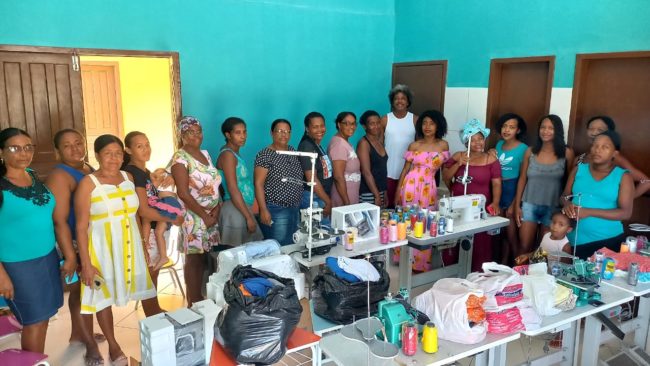
Sewing workshop of the Quilombo Sewing project. Photo: Quilombo Collection Gruta dos Brejões
According to Anailde, “this project is wonderful, it is an incredible thing that we always dreamed of, and now it is happening here in the community through the Casa Fund”. With the support, 10 new cutting and sewing machines were acquired, in addition to benches, supplies such as knitwear, threads, accessories for the machines and training for women to improve their sewing techniques. Anailde tells us that “everyone is excited about sewing, even in August we want to have a Miss Quilombola parade. It will be the girls in the community wearing the clothes we made.”
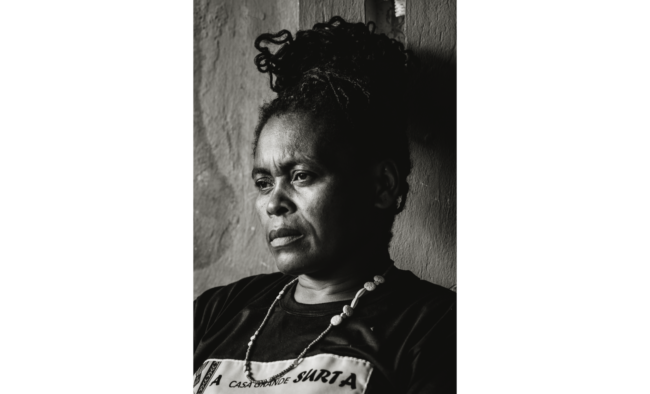
Anailde Pereira dos Santos, President of the Quilombola Association of Gruta dos Brejões. Photo: Leandro Ribeiro and Lenec Mota (distropya.com)
In Pombal, Paraíba, about 800 kilometers from Morro do Chapéu, the Quilombo dos Rufinos community is also taking important steps towards financial sustainability. Like Quilombo Gruta dos Brejões, the Rufinos are opening the way for a type of tourism that values traditional quilombola culture and the environment.
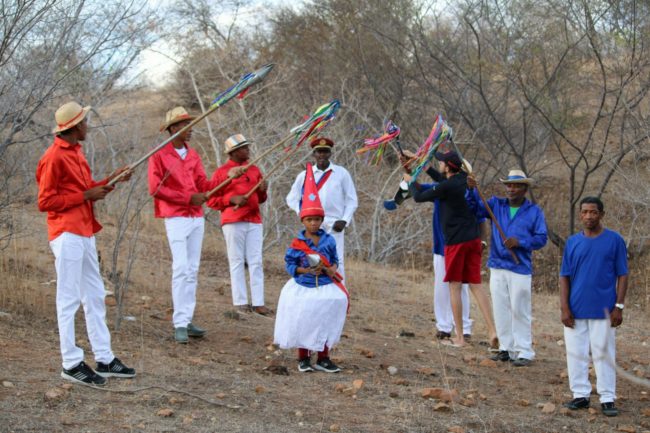
The folk and cultural group, Os Pontões, has more than 200 years of history and tradition. Photo: Thiago Rodrigues
Quilombo dos Rufinos, recognized by the Palmares Cultural Foundation in 2011, is one of the quilombos in the municipality of Pombal, as is Quilombo dos Daniel. The communities are guardians of secular traditions, such as the folk and cultural group, Os Pontões, which has existed for at least 200 years. According to the association’s president, Thiago Rufino, who is a historian and currently works on the historical record of his community, the Pontões tradition has its origins in the Nossa Senhora do Rosário festivities and is part of a historical struggle of the black community that also wanted to participate in the religious festivals, but for many years it was not allowed to celebrate.
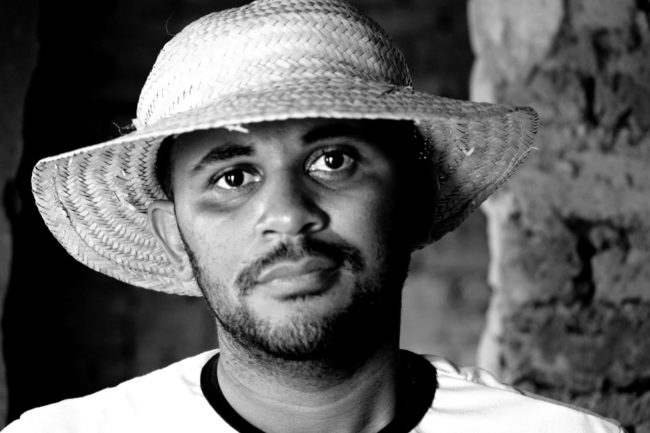
Thiago Rufino is a historian and current president of the Quilombola Association of Rufinos. Photo: Thiago Rodrigues
The Quilombola dos Rufinos Association was founded in 2013 and aims to provide better living conditions for it´s residents. In all, 135 families are part of the quilombola community, but only 42 live within the territory. In 2020, with the pandemic, the community felt the impacts in different ways, Thiago Rufino tells us that “in addition to the human loss of three members of the community, victims of this sad disease, the socio-economic impact was gigantic. The Os Rufino handicraft group suffered a significant reduction in the output of its handicraft products, which directly impacted the profitability of artisans. Craft fairs, from Paraíba exhibitions to further a field, suspended because of the pandemic, it was not possible for artisans to participate in these opportune marketing places, because of the closure due to COVID. Therefore, there was a reduction in the financial return for the group, which directly impacted their subsistence income.”
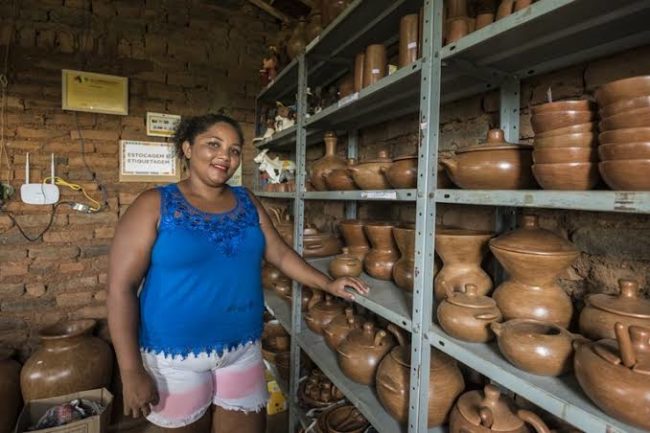
Clay pottery is an important source of income in Quilombo dos Rufinos, but sales were impacted during the pandemic. Photo: Thiago Rodrigues.
In 2021, the Association registered its project Ethnic Tourism and Valorization in the lands of the Quilombolas “Os Rufinos” in the Casa Fund Call and the initiative was selected. According to Thiago, “the support was very important and it was the first success in funding projects that we received”. The objective of the project is to mitigate the impacts brought by the covid and also to strengthen community tourism as a way to generate work and income.

Damião da Silva Santos, member of the folk and cultural group, “Os Pontões” Photo: Thiago Rodrigues
Currently, the community already receives tourists sporadically, but now the idea is to organize and professionalize the community so that they can receive groups of scheduled tourists. In addition to the natural attractions, such as ecological trails and the Piranhas River that cuts through the community, visitors will be able to have a real experience of what life is like in the quilombo and learn more about the quilombola culture. The project is supporting the construction of a kitchen that will be built according to traditional building standards, using beaten clay brick, produced on location in the community. At the restaurant, tourists will be able to taste typical dishes such as baião de dois, o quarenta, feijoada, mungunzá and cocada.
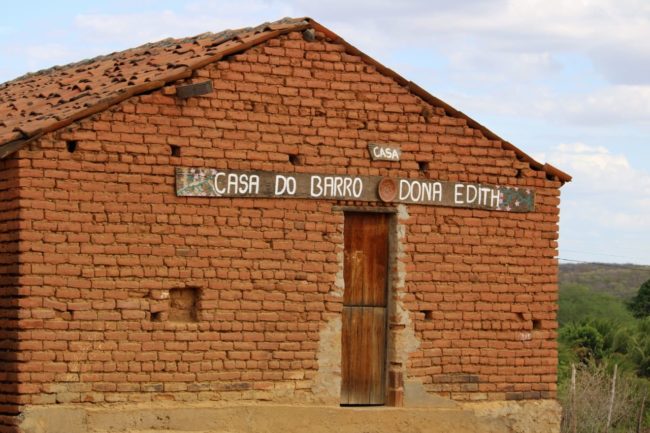
Casa do Barro (Earth House) Dona Edith is a historic building and the workshop where clay pottery is made in Quilombo dos Rufinos. Photo: Thiago Rodrigues
In addition to the typical dishes, visitors will also be able to discover Casa do Barro and the artisanal ceramics made in the community, an art passed down for at least three generations. Within the tourism project, training in Afro hairstyles is also included, a tradition that already existed within the community, but was dormant and is now being restored. Hairstyles, in addition to valuing the culture, also increase the self-esteem of the community.
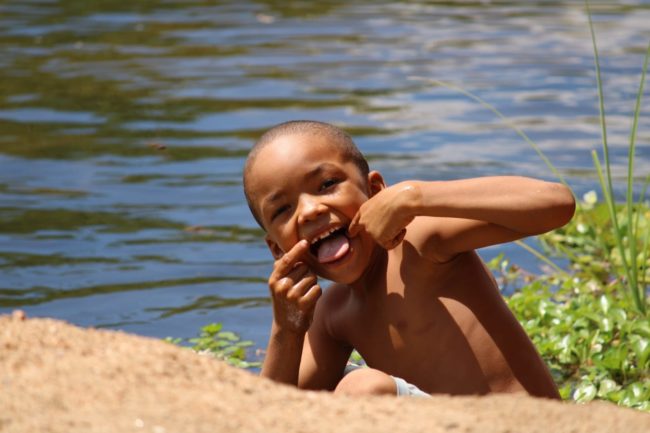
João Miguel dos Santos Rufino, representative of the new generation of Rufinos. Photo: Thiago Rodrigues
The result of a project like this doesn’t happen overnight, it’s a slow process that needs its own time to happen. But it is an important initiative. Some families that had moved to nearby cities are now starting to return to their traditional territory with new job prospects. Community tourism and clay pottery will be a good income supplement for some people, but for others it will be the main source of income. The Association has a partnership with Sebrae and there are already tourism groups scheduled for July and August 2022. There are still challenges such as access to the community itself, which in times of flood in the Piranhas River is isolated from the rest of the municipality, but gradually things are changing and there is already a project for a new bridge. Thiago tells us that “the idea is that this project is not just something for now, but something for the future, that has long-term results”. We hope that this and other connections between quilombola communities and a sustainable future will be strong and lasting, and that good living will become routine for future generations.
Alliance between Funds
This initiative was supported within the context of the Alliance between Funds – which emerged from the community mobilization for racial, social and environmental justice – proposing a new way of acting in the philanthropy ecosystem in Brazil, collaborative philanthropy for social justice.
Comprised of the Baobá Fund for Racial Equity, the Brazil Human Rights Fund and the Casa Socioenvironmental Fund, the Alliance between Funds aims to promote greater direct resources for indigenous peoples, quilombola communities and other traditional peoples most vulnerable to the COVID-19 pandemic.
Together, the Funds made an initial contribution of R$ 2.5 million, distributed in different funding programs, with three priority areas: 1) defense of rights; 2) community resilience and economic sustainability of families; and 3) food sovereignty of underprivileged populations in the face of the pandemic.
